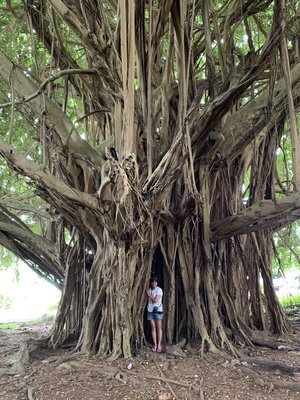The thing about meditation is: You become more and more you.
David Lynch
When on vacation in Croatia a few weeks ago, I completed a full year of unbroken daily meditation practice. It felt like quite an achievement for me.
Each morning right after waking up, I pull my meditation cushion up to my bed (when at home), set a timer (I use InsightTimer), and meditate for about 25-30 minutes, about half silent and half guided.
This whole thing started when I was in Portugal last summer with a friend while I was going through the throes of deep heartache and other major stressors. I realized it was helping, so I decided to keep going, thinking I'd perhaps meditate for an entire month.
Well those 30 days turned into 3 months, which turned into 6 months, and you get the point. I never set out to meditate for a year, but it happened and it's changed my life. I don’t think I’m exaggerating when I say this.
MAJOR ANXIETY REDUCTION: I’ve struggled with deep and chronic anxiety for most of my life. Though the tide has been shifting for many years with all of the personal work I’ve done, the changes finally feel like they’ve taken hold. I feel much more grounded and calm most of the time. This is huge for me, the biggest win, and it feels astounding.
BETTER COMMUNICATION: I feel the way I communicate has become much more simple, reliable, and forthright. My thoughts feel clearer, my intuition louder. Better communication has helped me in all facets of my life - from working with my patients, to teaching, to my personal life.
LESS REACTIVITY: I feel much less reactive to my emotions. We are humans and that means feeling various and changing emotions is just a part of life. I still feel strong emotions often, but I can feel them more purely now, without getting all wound up in them. And I can be with them until they pass, as all emotions do. Some say, emotion = “energy in motion.”
MORE CONFIDENCE: I feel more confident in who I am as a person, what I want in life, and how I offer my energy and time to others. I am learning boundaries much more clearly. I have gotten further along on the path of breaking my perfectionist tendencies, a trauma-based pattern that holds me back. And, I am accepting many pieces of me that I had once rejected. I think of this as shadow work and core self-acceptance.
INCREASED WHOLENESS and CONNECTION: I feel more whole, connected, and loving. I feel a greater sense of communion with myself and my communities, closer to my loved ones, and more perceptive of my surroundings.
MORE JOY: I feel lighter, more joyful, and more buoyant much more of the time. Makes life a lot more fun, let me tell you!
GRATITUDE PREVAILS: There’s a lot more gratitude in my life too. This is also a habit I’ve ben practicing alongside daily meditation.
HABIT CHAIN: This habit has led me to start other habits that have stuck, like working out more consistently, doing breath practices throughout the day, prepping food at home on Sunday for the week, and more.
I talk about mediation frequently because I believe mind-body medicine practices - all types of tools that allow our nervous systems to function better, that build resilience, compassion and wisdom, and that allow for healthier choices - are foundational for optimal whole health, of the mind, body, and spirit.
Good health starts with good habits.
What one, small good habit can you start with today?
( and p.s., if you’re wondering if I’m stopping now, the answer is definitely not!)














